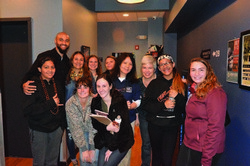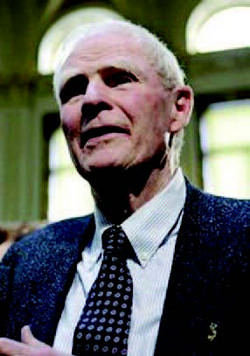University graduate students who are enrolled in the Communication, Culture, and Community (CCC) course worked closely with a local nonprofit, Konscious Youth Development and Service (KYDS) in Asbury Park, during the fall 2018 semester.
KYDS was founded by Monmouth alumni Mychal Mills and Rodney Salomon. The organization prepares and creates future leaders in Asbury Park, Neptune, and the larger Monmouth County region through holistic intervention.
Deanna Shoemaker, Ph.D., Director of the Master of Arts in Communication, teaches the CCC course, which is a requirement for students in the Corporate and Public Communications (CPC) Master’s Program.
She said, “We can all work to define our ‘community’ more broadly and inclusively.”
“I believe students who are engaged, empathic, and culturally sensitive communicators focused on both local and global challenges will play transformative roles in shaping our future in the 21st century,” Shoemaker continued.
The main goal of the course was for students to get more involved and be with the local community. They also participated in community functions run by KYDS such as monthly meditation sessions.
Taylor Morelli, a communication graduate student who takes the class, said, “I was very interested in the course because of its emphasis on community leadership, activism, and volunteering. The course provided a great foundation of how to work with community partners in a conducive way that is beneficial to both parties.”
“Through my experience working with KYDS, it opened my eyes to the amazing work community organizations are doing,” said Morelli. “Taking time out of my first stressful semester of grad school to join KYDS meditation or yoga class helped me gain a better understanding of the work they do and helped me destress as well.”
The students also did research on gentrification. According to the Sociology Index, gentrification is defined as a process of change in the social and economic condition of urban neighborhoods where poorer original residents are replaced by newcomers from middle class and professional groups.
In December 2018, the students presented their academic research on positive youth development at the Monmouth/Lakehouse shared space.
Shoemaker said, “Using a service-learning model, we explore ethical ways of studying culture through participant observation, historical research, and partnering with an organization to collaborate on community-based ethnographic research projects.”
Shoemaker made this connection between Monmouth and KYDS when she met Mills and Salomon while working in an ambassador training program at the Food Bank of Monmouth and Ocean Counties, now called Fulfill, in the past.
Her partnership with KYDS eventually laid the foundation for students to get the opportunity to work with the organization through the CCC course during the fall 2018 semester.
When asked about what motivated her to make this connection with KYDS, Shoemaker said, “KYDS has deep roots in Asbury Park, a town I love and live near. I’ve watched the east side of Asbury go from what was described as a ‘ghost town’ 14 years ago to a rapidly gentrifying hot spot east, and now just west of the train tracks.”
Having moved to the area from Austin, TX, Shoemaker said that she has seen the impact of gentrification’s rapid growth which, “typically leads to a lack of affordable housing and racial segregation that displaces many long term, lower income residents and people of color.”
Mills had the motivation to create this connection with Monmouth through his own student experience of working within community settings and working with different nonprofits.
“I knew that especially, starting this nonprofit, it would be a great opportunity for Monmouth to be involved…There’s a little pride there from myself, being a Monmouth alum,” he said.
He also hopes that the students learned more about the history of Asbury Park through the stories of people in the community.
“Seeing it from the outside in, it’s easy to miss those little pieces of the community that have been there forever, before the changes, before the growth and development of business,” Mills explained.
The CCC course is taught by Shoemaker every fall semester. She also typically teaches a performance-based class each spring that involves a community-related project for undergraduate students; Group Techniques in Performance.
Both of these classes are supported and funded by a grant from the University’s Urban Coast Institute.
PHOTO COURTESY of Dr. Shoemaker




